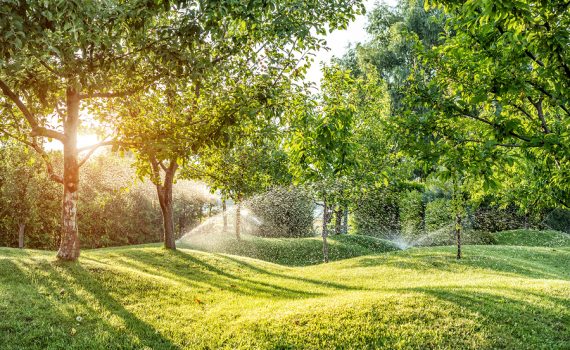Extended periods of dry weather leave backyard trees dependent on homeowners for survival. Surprisingly, lack of rainfall kills millions of trees across the country. In fact, according to KPCC’s environment and science coverage, 27 million trees died just in California during the 2017 drought. In an average year, the Golden State loses roughly a million trees. But excessive watering can make a tree overly reliant on irrigation, so we’ve put together this handy tree water guide to clear up any confusion.
How Much Water Do Trees Need?
The goal is to supplement enough water to support the growth and health of your trees. But you still want them to be resilient. It’s important not to water so much that it encourages more canopy growth than would occur (on a good year) with natural rainfall.
For mature trees, aim to moisten the soil up to 10” or more. A weekly deep soaking is better than a frequent shallow watering guide. Even if your lawn receives direct irrigation, it’s probably not sufficient for your trees. Shallow waterings cause tree roots to stay near the upper layers of soil. They’re more likely to dry out on the surface, and also more vulnerable to drought.
Watering Guide to New Trees
When you plant a new tree, most of its roots will remain within a root ball for a few months. You can help the tree anchor itself by keeping the surrounding soil moist. This encourages healthy roots to grow. After several months, extend the watering zone to include the area under the tree’s canopy. If nature doesn’t provide soaking rains, water your new tree as many as three times per week, or the root ball can dry out. It takes a couple growing seasons for your new tree to establish itself.
Should I Mulch Under My Trees?
Mulch prevents weeds and grass from taking over and bullying your tree for water. A layer of organic mulch also conserves moisture. Use two to three inches of shredded bark or pine straw, but avoid piling it against the trunk because it could cause rot.
The amount of water a tree needs is decided by multiple factors, such as its species and age, as well as the soil quality and local climate. For a more personalized tree watering guide, please contact our team of trained arborists at (925) 233-6877.
 Bringing Sexy Back Into Your Yards
Bringing Sexy Back Into Your Yards 
